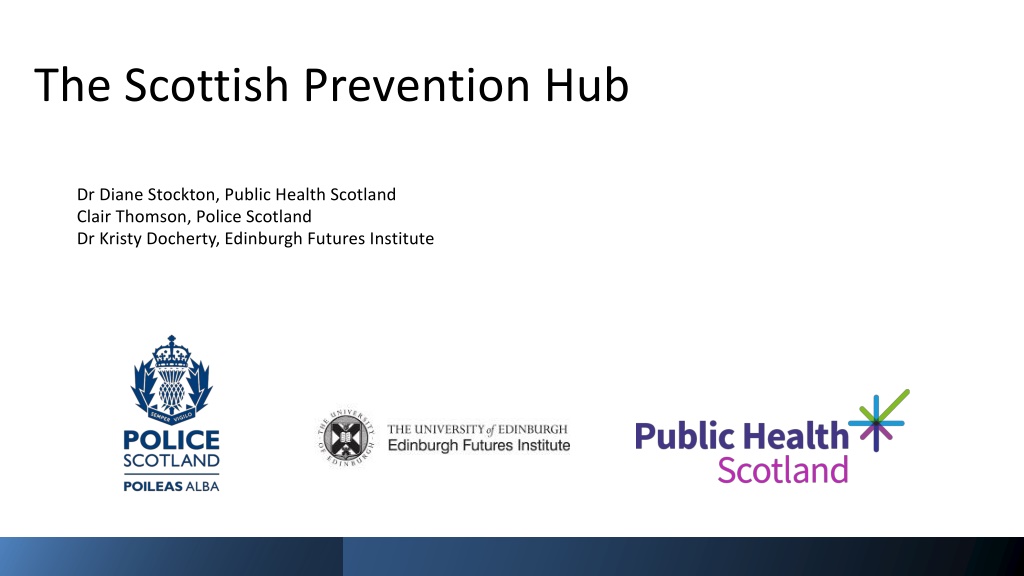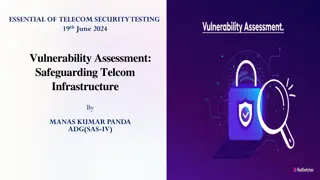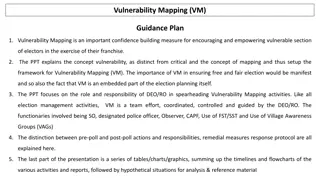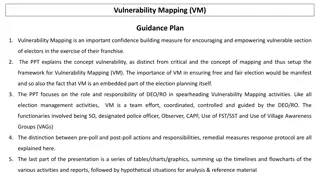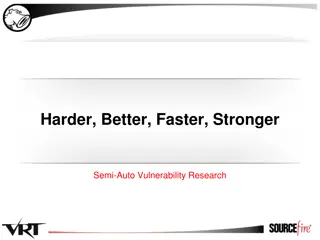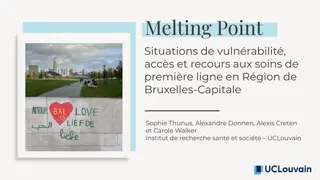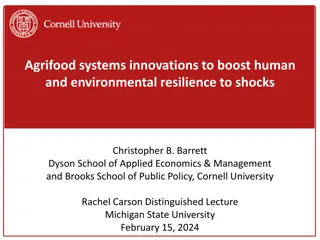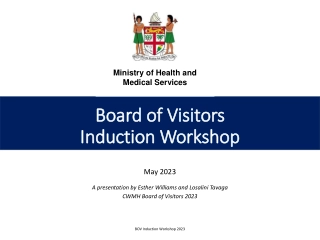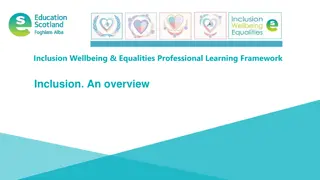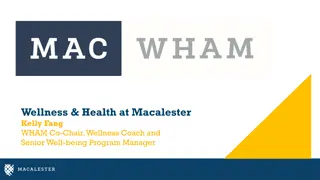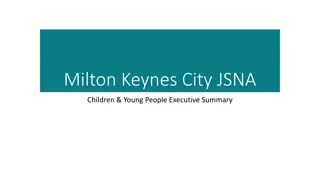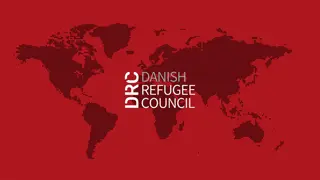Understanding Vulnerability and Health Challenges in Scotland
Scotland's health challenges are highlighted through data on vulnerability markers such as sexual crimes, mental health issues, and rising missing person rates. Primary prevention is identified as a critical area needing attention to address entrenched challenges and societal impacts like the cost of living and pandemic effects.
Download Presentation
Please find below an Image/Link to download the presentation.
The content on the website is provided AS IS for your information and personal use only. It may not be sold, licensed, or shared on other websites without obtaining consent from the author. Download presentation by click this link. If you encounter any issues during the download, it is possible that the publisher has removed the file from their server.
Presentation Transcript
The Scottish Prevention Hub Dr Diane Stockton, Public Health Scotland Clair Thomson, Police Scotland Dr Kristy Docherty, Edinburgh Futures Institute
Overview Overview of current conditions About the Prevention Hub Exploring the challenge of collaboration Collaborative Leadership our underpinning methodology
JOINT STRATEGY FOR POLICING 2023 Justice in Scotland 2022: Vision & Priorities outcomes Scottish Government Public Health Related Strategies The National Performance Framework
Demand Analysis - 2022 Vulnerability OFFICIAL POLICE ONLY Long term trends (5 year 2017/18 2021/22) 20% increase Drug Concern Markers 60% increase Adult Concern Markers 36% increase Child Concern Markers 97% increase Child Sexual Abuse & Exploitation Referrals 46% increase Mental Health Markers Females within iVPD Victims of Sexual Crime From analysis of female nominals recorded on iVPD we are seeing a substantial increase in vulnerability markers such as Sexual Harm and Mental Health over the last five financial years. The data shows you are substantially more likely to be the victim of sexual crime if you are female, and males make up the majority of all offenders in this crime group. Rising Cost of Living & Mental Health Missing Persons Exploring persons within iVPD flagged as 'financially at risk' the data shows both genders have seen a rise over the last 5 years, with males seeing a faster rise of 63% compared to females at 23%. The continued rise of mental health and vulnerability markers appears set to continue due to societal impactors such as the rise in the cost of living and long lasting effects of the pandemic. The data appears to flag clearly that young people and females are some of the most vulnerable in our society, being significantly more likely to become a missing person or the victim of a sexual crime. Missing Person rates appear to correlate with age, however you are substantially more likely to become a missing person under the age of 16 than in any other age group. 4
After decades of improvement, Scotland's health is worsening
Three Levels of Prevention Primary Prevention Representing the most challenging area to effect change Resistant to change and entrenched challenges Comparatively low in numbers but represent a large proportion of individual, family and community harms Interventions are targeted, intensive and time-consuming Medium level response, targeting those on the cusp or involved at low levels Behaviour is not yet entrenched Secondary prevention level responses are more targeted than primary population level Programmes and interventions are designed to either halt/slow and reverse behavioural trajectories Population level responses designed to reduce the effect of negative drivers. Can most easily be identified as policy e.g. pre birth and early years programmes, all levels of education, minimum unit pricing, weapons legislation Intended to reduce the number of individuals, families or communities requiring support at secondary or tertiary levels
Long-term investment in prevention: every sector has a role Scottish Government Local Health and Social Care Government Communities and Third Sector Wider Public Sector Business
Background and context Collaboration Agreement between Police Scotland and Public Health Scotland in (July 2021) Public Health Approach to Policing Memorandum of Understanding between EFI, Police Scotland and Public Health Scotland (June 2023) & launch (August 2023)-establish The Scottish Prevention Hub. Learning from Collaboration Leadership Pilots, draw from what is happening, connect and join up.
The Scottish Prevention Hub Reduce health and wellbeing inequalities with a focus on primary prevention
The Scottish Prevention Hub - Why? 01 02 05 Christie Commission Resource Spending Review Fragmented System Widening Inequalities Public Service Sustainability Scotland's health is worsening. Change is possible through investment in primary prevention. Empowerment, Integration, Prevention and Efficiency. Need to collaborate, coordinate and connect local and national responses. Continuing pressures facing the Scottish budget. Increasing demand, low morale, scrutiny, digital and tech advances and tightening public sector finances. 07 09 Convene Wider Partner Involvement Health and Justice Links Benefit of Public Health Approach Complexity of Collaboration Address Data Sharing Barriers Factors leading to poor health such as ACEs, poverty, social exclusion, addiction increase the likelihood of crime. Active commitment to prevention and the evidence, evaluation and assessment of its impact. Difficulties around data- sharing present significant barriers to delivering more joined- up services to citizens. Pay attention to collaborative leadership and building the capability and capacity for the work. Single organisations do not have all the answers, generational harm cannot be undone easily.
The Scottish Prevention Hub Key Workstreams Data Insights Research & Evidence Collaborative Leadership Co-location Learning Collaboration Build a common data platform - real-time linked data to inform - operations, policy and research Enable Challenge led co-designed research + what works Capture and catalyse to drive all workstream activity Re-design for collaborative working practices, efficiencies, sustainability & impact Transform learning experiences - share, inspire & empower Build capacity and capability for complex work 6 1 2 3 4 5
S y s t e m - f o c u s e d Adopting a systems mind-set requires thinking about the contributions, processes and outputs from all relevant organisations across any given system, including citizens, all of which are considered to impact on an outcome. The idea of opening up issues, in order to make sense of them and any potential root causes, inspires and alters the conversations that people choose to have. Docherty, K., 2021. Exploring collective leadership and co-production: an empirical study. In Processual Perspectives on the Co-Production Turn in Public Sector Organizations (pp. 130-155). IGI Global.
E m e r g e n c e Taking an emergent approach (as opposed to a planned style) consists of a continuous process of experimentation and adaptation, which may result in small to medium incremental adjustments, leading to ideas, innovation and change. This style of working disrupts traditional patterns, with new ideas and opportunities thought to emerge out of the process. Collective thinking and sense making is encouraged as group members strive to maintain an openness to stay with whatever emerges. Docherty, K., 2021. Exploring collective leadership and co-production: an empirical study. In Processual Perspectives on the Co-Production Turn in Public Sector Organizations (pp. 130-155). IGI Global.
B e i n g R e l a t i o n a l Taking a conscious step towards getting to know other people and their work, beyond the polite salutations, and privileging relational matters above or equal to a task, can adjust typical communication and behavioural patterns. Emphasis is given to the importance of bringing the whole person into the room, rather than representations of a role or an organisation. It is through these exchanges that diverse viewpoints are more comfortably shared, as members relate together, shaping a new course of action. Docherty, K., 2021. Exploring collective leadership and co-production: an empirical study. In Processual Perspectives on the Co-Production Turn in Public Sector Organizations (pp. 130-155). IGI Global.
I n q u i r y l e d Beginning an inquiry into the group process, the issue or problem, and any deeply held personal values, behaviours and beliefs, promotes a quest for fresh learning, the need to be open and curious, asking more questions and enabling different perspectives to be aired. It seeks to merge the subjective (what do I think) with the intersubjective (what do we think) and the objective data (what has been done already and what was the result), in order to enrich self-awareness and shape a different way of working Docherty, K., 2021. Exploring collective leadership and co-production: an empirical study. In Processual Perspectives on the Co-Production Turn in Public Sector Organizations (pp. 130-155). IGI Global.
What s Next? Move into our base at the Edinburgh Futures Institute. Continue to develop and deliver on our key activities linked to Prevention and our 6 workstreams. Communicate what we are doing as much as possible and involve wider partners. Explore and share our experience of collaborative leadership in action, build momentum for further support/learning linked to growing capacity for complex collaborative work.
Thoughts, feedback, questions Thanks for listening. Please contribute via the chat with any questions or thoughts. Thinking about what you have heard today and drawing from your own experiences, what do you think enables and gets in the way of 1. effective collaboration and/or 2. primary prevention initiatives?
